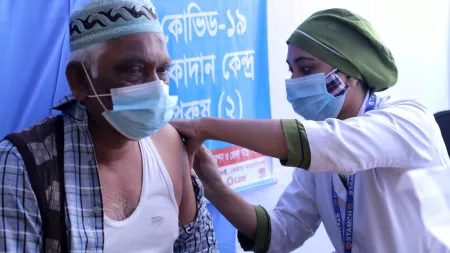Photo: To spread and accelerate government of Bangladesh’s effort to provide COVID-19 vaccine, VSCF project provided training to 72 government vaccinators and 100 volunteers who are currently rendering service to vaccination booths.
New Report Reveals for Every Dollar Spent on Vaccine, $2.50 Needed to Provide Frontline Health Workers with Training, Equipment, Salaries.
(March 25, 2021- Atlanta, GA) - A new report, “Our Best Shot: Women Frontline Health Workers in other countries are keeping you safe from COVID-19”, by CARE revealed that a comprehensive vaccine delivery strategy - that includes support for frontline healthcare workers, 70% which are women - requires policy makers to invest $5.00 dollars in delivery for every $1 they spend on vaccines themselves.
Coming at a time when new and highly contagious variants of COVID-19 are emerging in countries that are struggling to access the vaccine and control the pandemic, the report adds that $2.50 must go to funding, training, equipping, and supporting health workers—especially women—who administer vaccines, run education campaigns, connect communities to health services, and build the trust required for patients to get vaccines.
“Frontline healthcare workers, more than two-thirds of whom are women, are frequently underpaid, undervalued and are often forced to work in unsafe environments with little to no support,” CARE USA President and CEO Michelle Nunn said. “Ensuring these vaccines are distributed fast, fair and equitably is going to be a historic undertaking, but we cannot afford for these critical workers to be pushed to the back of the line. Women front line workers help build trust, educate patients, protect rights, and help everyone access vaccines and services. If we don’t invest in these women and their rights, we won’t see the benefits of the COVID vaccines.”
The report also notes that for every $1 invested in vaccines in less wealthy countries, wealthy countries will see $4.80 of economic benefit because economies can fully re-open sooner, while failing to make this investment could cost wealthy economies $4.5 trillion in economic losses.
Beyond the Vaccine Vial: The new CARE report breaks down the actual cost of vaccinating the public and the entire delivery system:
-
CARE estimates that to conduct a comprehensive strategy in this level of global pandemic, policy makers need to invest $5.00 dollars in rollout for every $1 they spend on vaccines themselves.
-
$2.50 to supporting health workers, including training, equipment, and salaries. This estimate includes fair pay and working conditions for both full-time health staff and part time workers, as well as surge capacity for vaccinators.
-
$0.15 for childcare costs to make it possible for frontline health workers to function effectively.
-
$1.70 to strengthening and maintaining health infrastructure such as cold chains, vaccine tracking systems, power supplies, and administrative costs.
-
$0.65 to social mobilization and education campaigns to increase vaccine acceptance.
-
$0.15 to keeping health workers safe from COVID, including the increased time it takes to administer vaccine campaigns while enforcing social distancing and higher needs for personal protective equipment.
To arrive at the above cost estimate, CARE reviewed more than 100 published studies about vaccine costs and based the core model on WHO’s costing figures for a proposed Ebola vaccine strategy in 2016, adding other variables—such as more comprehensive staff costs and safety measures for COVID-19—to that core model to ensure a more comprehensive picture.
CARE’s Fast and Fair Vaccine Campaign:
The new report comes as part of CARE’s larger Fast and Fair Vaccine Access Campaign - a two-year vaccine initiative started in 2020 to work with national, regional and local governments implementing vaccine campaigns, to ensure they are efficient, equitable and reach those most at risk, including women and frontline health workers.
“COVID has proven that our world is intricately connected. None of us are safe from this pandemic, until all of us are safe. That is why CARE is working to help 100 million of the most marginalized and vulnerable people have fast and fair access to the COVID vaccines over the coming years,” CARE USA Vice President of Humanitarian Affairs, Deepmala Mahla said.
“At CARE we believe healthcare is a human right, and we’ll ensure the vaccine is going to those most in need, regardless of where they live, and that starts with the frontline healthcare workers putting their lives at risk each day across the world. This report is key to that, helping us inform the decisions by policymakers, the private sector and other stakeholders to support frontline health workers in the last mile of care.”
For More information:
Kalei Talwar
Press Officer
[email protected]
